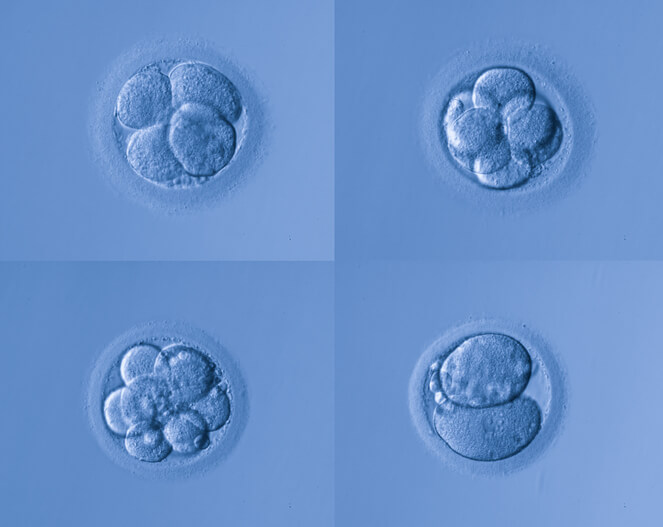You may have heard that an important part of the surrogacy medical process is the preimplantation genetic screening, or PGS. But what exactly is PGS, and why does it need to occur?
PGS is the medical process that determines whether an embryo is healthy enough to be transferred to a surrogate’s uterus. Rather than chance a miscarriage or the birth of a child with a genetic condition, PGS allows fertility professionals to gauge the health of an embryo ahead of time — reducing the likelihood of unsuccessful results.
PGS examines the specific chromosomal makeup of each embryo. This is where genetic disorders or conditions can be detected. If an embryo does not have the proper number of chromosomes (26 — 13 from each parent) or seems to have another abnormality in chromosomes, it is known as an aneuploid or abnormal embryo. These embryos are usually not suitable for implantation, and a fertility specialist will seek out another normal embryo instead.
PGS is usually completed in all surrogacy processes, no matter the genetic history of the intended parents or gamete donor (some intended parents who have already completed IVF will have completed this screening, as well). While the screening does help to confirm whether either parent is a carrier for a genetic condition or passes on increased chromosomal abnormalities because of their age or other factors, it’s also completed for the safety of the surrogate. By screening multiple embryos from the intended parents, fertility specialists can choose the healthiest one for transfer — eliminating the need to transfer multiple embryos “just in case.” This protects the surrogate from the risks of carrying multiples.
Being concerned is completely natural when facing this process, but remember you aren’t alone. Other intended parents and surrogates have gone through this before, and reading their first-hand accounts could help you.
So, how does PGS work?
The PGS process takes place after embryos have been successfully fertilized and incubated. About 5 to 7 days after the fertilization process, fertility specialists remove certain cells from the embryo that will eventually develop into the placenta (this does not impact the development of the embryo). These cells are passed along to a laboratory, where specialists examine them for chromosomal abnormalities. Results are usually made available to the fertility clinic and intended parents after 7 to 10 days.
While intended parents have the chance to choose their fertility clinic, they usually will use the genetic screening company that their clinic has already developed a partnership with.
It’s important to note that PGS does not screen for specific diseases but just for at-risk embryos with genetic abnormalities (some chromosomal conditions, like Down’s syndrome, are easy to detect by counting chromosomes). To identify diseases, intended parents and their fertility clinic may instead choose to complete pre-implantation genetic diagnosis, which screens for single-gene defects. Both PGS and PGD can be performed at the same time.
Keep in mind that neither of these processes are a replacement for prenatal screening later on in a pregnancy.
Why is PGS in surrogacy so important?
While genetic screening can be important in every in-vitro fertilization pregnancy, it’s especially important in surrogacy. Because the woman carrying the child is not the intended mother, it’s important that her safety is protected, as well. Completing PGS makes sure only the best embryos are transferred to her uterus, decreasing the chance that she experiences a miscarriage or other pregnancy complications later down the line.
It’s also helpful for the intended parents, who may have already gone through years of infertility before deciding on surrogacy. By only transferring the best embryos, they reduce the chance they will experience more disappointment if an embryo does not successfully implant.
When you work with American Surrogacy and the fertility clinic for your surrogacy process, we will coordinate to make the embryo transfer process as safe and efficient as possible. Your surrogacy specialist will always be there to offer you advice and support, especially if your genetic screening and IVF process takes longer than anticipated.
To learn more about how American Surrogacy will coordinate with your fertility clinic, or to learn more about the medical process of surrogacy in general, please contact us today.

5 thoughts on “What is Preimplantation Genetic Screening in Surrogacy?”